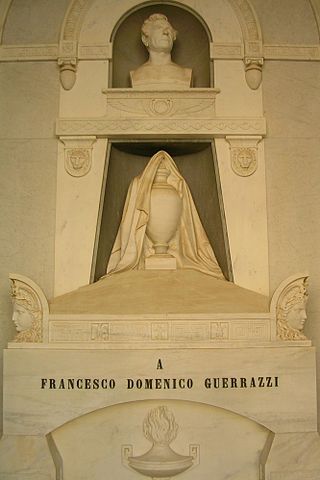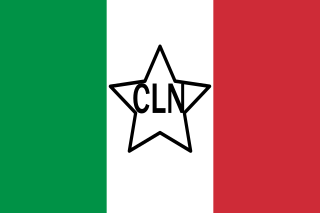
The International Brigades were soldiers set up by the Communist International to assist the Popular Front government of the Second Spanish Republic during the Spanish Civil War. The organization existed for two years, from 1936 until 1938. It is estimated that during the entire war, between 40,000 and 59,000 members served in the International Brigades, including some 10,000 who died in combat. Beyond the Spanish Civil War, "International Brigades" is also sometimes used interchangeably with the term foreign legion in reference to military units comprising foreigners who volunteer to fight in the military of another state, often in times of war.

Francesco Domenico Guerrazzi was an Italian writer and politician involved in the Italian Risorgimento.

The Italian Resistance consisted of all the Italian resistance groups who fought the occupying forces of Nazi Germany and the fascist collaborationists of the Italian Social Republic during the Second World War in Italy from 1943 to 1945. As a diverse anti-fascist and anti-nazist movement and organisation, the Resistenza opposed Nazi Germany and its Fascist puppet state regime, the Italian Social Republic, which the Germans created following the Nazi German invasion and military occupation of Italy by the Wehrmacht and the Waffen-SS from 8 September 1943 until 25 April 1945.

The Italian Civil War was a civil war in the Kingdom of Italy fought during the Italian campaign of World War II between Italian fascists and Italian partisans and, to a lesser extent, the Italian Co-belligerent Army.

Giancarlo Pajetta was an Italian communist politician.

Walter Audisio was an Italian partisan and communist politician, also known by his nom-de-guerreColonel Valerio. A member of the Italian resistance movement during World War II, Audisio was involved in the death of Benito Mussolini, and personally executed the dictator and his mistress Clara Petacci according to the generally accepted account of the event.

The Garibaldi Battalion was a largely-Italian volunteer unit of the International Brigades that fought on the Republican side of the Spanish Civil War from October 1936 to 1938. It was named after Giuseppe Garibaldi, an Italian military and political figure of the nineteenth century.
The Porzûs massacre was an intra-partisan massacre of the Italian resistance during late World War II, on 7 February 1945. It saw the killings of 17 partisans belonging to the Brigate Osoppo, a strongly Catholic formation, by communist partisans of the Gruppi di Azione Patriottica. Four members of Brigate Osoppo were killed when a group of them was ambushed, while the survivors were taken prisoner and summarily executed in the following days. The event is still the object of study and controversy in Italy.

Randolfo Pacciardi was an Italian politician.

First Partisan battalion Pino Budicin was a military unit of the” Vladimir Gortan” Brigade, 43rd Division of the 4th Army Corps of the Yugoslav National Liberation Army during World War II. The battalion was almost entirely made up of Italians, most of them from the former Italian region of Istria.

La California is a town in Tuscany, central Italy, administratively a frazione of the comune of Bibbona, province of Livorno. At the time of the 2011 census its population was 1,090.
The Italian partisan brigades were armed formations involved in the Italian resistance during the World War II.

The Brigate Garibaldi or Garibaldi Brigades were partisan units aligned with the Italian Communist Party active in the armed resistance against both German and Italian fascist forces during World War II.
The Brigate Osoppo-Friuli or Osoppo-Friuli Brigades were autonomous partisan formations founded in the headquarter of the Archbishop Seminary of Udine on 24 December 1943 by partisan volunteers of mixed ideologies, already active in Carnia and Friuli before the Badoglio Proclamation of 8 September. The partisans in this brigade adhered to various and often conflicting ideologies, including both secularism and Catholicism, as well as socialism and liberalism.

Ilio Bosi was an Italian communist politician and trade unionist.
Guido Picelli was an Italian anti-fascist, politician and soldier. He was a founding member of the Arditi del Popolo and a participant in the Spanish Civil War where he died in battle.

Azienda Trasporti Livornese, known as ATL, was a public company that managed the local public transport in Livorno and its province including Elba.
The anarchist brigades of the Italian Resistance were active during the Second World War, especially in central and northern Italy.

Olindo Vernocchi was an Italian politician, journalist and anti- fascist, national secretary of the Italian Socialist Party (PSI), member of the Constituent Assembly of Italy and president of the Istituto Luce.
Emilio Suardi was an Italian politician and partisan.














